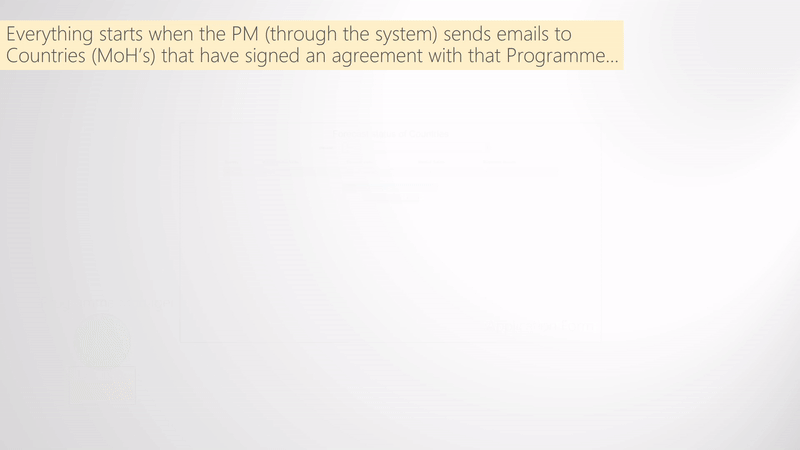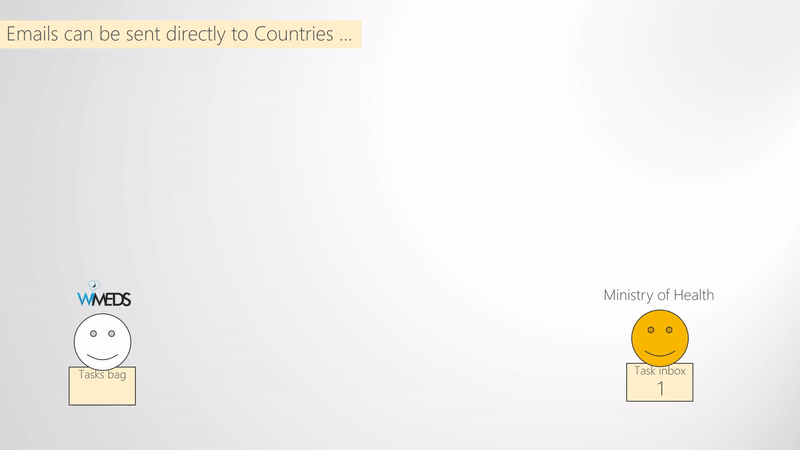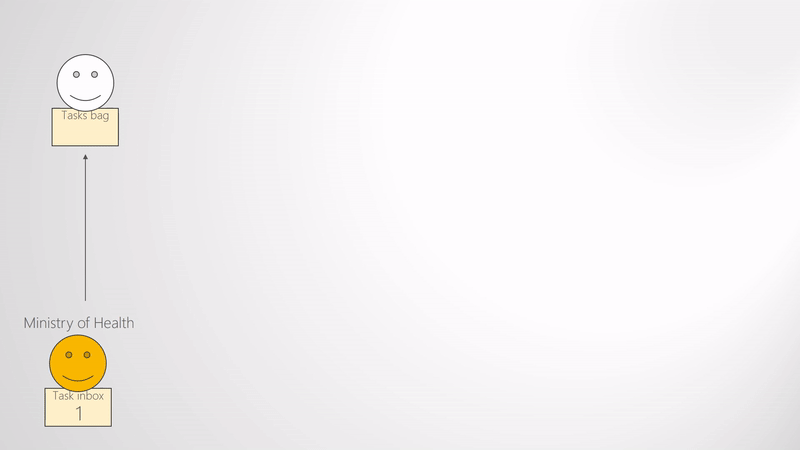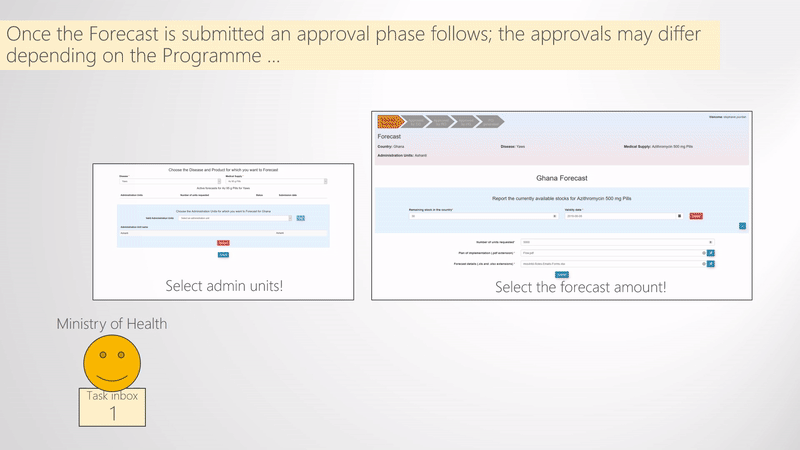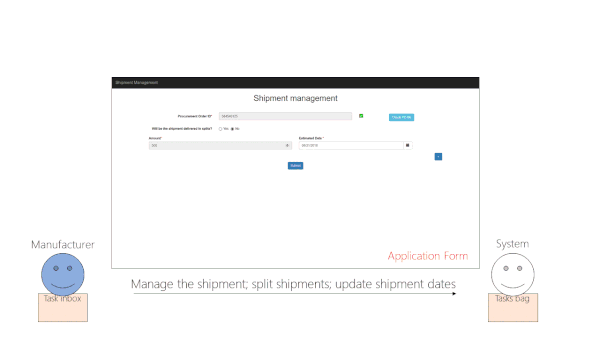Difference between revisions of "Forecasting Medical Supplies"
(→Forecast Approval) |
(→Call for Forecast) |
||
| Line 5: | Line 5: | ||
== Call for Forecast == | == Call for Forecast == | ||
<!-- Put information and images for each section --> | <!-- Put information and images for each section --> | ||
| − | [[File:1.CallForecast_new.gif|frame|right|text-bottom|900px|alt=Call For Forecast |<strong> | + | [[File:1.CallForecast_new.gif|frame|right|text-bottom|900px|alt=Call For Forecast |<strong>Call for Forecasting:</strong> when the Programme Manager sends emails to Countries that have signed an agreement with WHO.]] |
| − | + | <strong> Forecasting </strong> is the process/procedure of calculating the needs of a Country with respect to Medical Supplies for a given NTD, for a certain period of time. The calculation of the amount required for a Country is performed by the Country Officials (i.e., [[WIMEDS Actors#Ministry of Health (MoH)| Ministries of Health]]) in collaboration with WHO Medical Officers at the respective Countries (i.e., [[WIMEDS Actors#WHO Country Office (CO)|WHO Country Office]] and [[WIMEDS Actors#WHO Regional Office (RO)|WHO Regional Office]]). Once decided, the medical supplies need to be requested from WHO and this is done in a periodic fashion. However, [[WIMEDS Actors#NTD Programme Manager| NTD Programme Manager] is the actor that initiates the process. Thus, every year at a given period of time the Programme Manager sends automatic emails through WIMEDS to notify Countries that they can start their Forecasting process. The way this is done in WIMEDS is depicted in a high level view in '''Figure: Call for Forecasting'''. | |
| − | |||
| − | <strong> Forecasting </strong> is the process/procedure of calculating the needs of a Country with respect to Medical Supplies for a given NTD, for a certain period of time. The calculation of the amount required for a Country is performed by the Country Officials (i.e., [[WIMEDS Actors#Ministry of Health (MoH)| Ministries of Health]]) in collaboration with WHO Medical Officers at the respective Countries (i.e., [[WIMEDS Actors#WHO Country Office (CO)|WHO Country Office]] and [[WIMEDS Actors#WHO Regional Office (RO)|WHO Regional Office]]). Once decided, the medical supplies need to be requested from WHO and this is done in a periodic fashion. However, [[WIMEDS Actors#NTD Programme Manager| NTD Programme Manager] is the actor that initiates the process. Thus, every year at a given period of time the Programme Manager sends automatic emails through WIMEDS to notify Countries that they can start their Forecasting process. The way this is done in WIMEDS is depicted in a high level view in '''Figure | ||
=== Call for Forecast that requires a set of approvals === | === Call for Forecast that requires a set of approvals === | ||
| − | In certain scenarios the emails that are sent by the [[WIMEDS Actors#NTD Programme Manager| NTD Programme Manager]] can be received by [[WIMEDS Actors#Ministry of Health (MoH)| Ministries of Health]], only if they have first been approved by the [[WIMEDS Actors#WHO Regional Office (RO)|WHO Regional Office]] and the [[WIMEDS Actors#WHO Country Office (CO)|WHO Country Office]]. WIMEDS is configurable in order to support such cases. This is depicted in '''Figure | + | In certain scenarios the emails that are sent by the [[WIMEDS Actors#NTD Programme Manager| NTD Programme Manager]] can be received by [[WIMEDS Actors#Ministry of Health (MoH)| Ministries of Health]], only if they have first been approved by the [[WIMEDS Actors#WHO Regional Office (RO)|WHO Regional Office]] and the [[WIMEDS Actors#WHO Country Office (CO)|WHO Country Office]]. WIMEDS is configurable in order to support such cases. This is depicted in '''Figure: Call for Forecast with and without Approvals'''. |
| − | [[File:2.EmailApproval.gif|frame|right|text-bottom|50px|alt=Email Approvals |<strong> | + | [[File:2.EmailApproval.gif|frame|right|text-bottom|50px|alt=Email Approvals |<strong>Call for Forecasting with and without Approvals:</strong> when the Programme Manager sends emails to Countries this may need to go through an Approval phase.]] |
== Perform Forecast == | == Perform Forecast == | ||
Revision as of 15:38, 1 November 2018
The Process of Forecasting Medical Supplies requires the coordination and communication between different actors. In this wiki you can find information on how this process evolves from start to end. Overall the process is logically separated into five different sub-processes (actions) that are explained below.
Contents
Call for Forecast
Forecasting is the process/procedure of calculating the needs of a Country with respect to Medical Supplies for a given NTD, for a certain period of time. The calculation of the amount required for a Country is performed by the Country Officials (i.e., Ministries of Health) in collaboration with WHO Medical Officers at the respective Countries (i.e., WHO Country Office and WHO Regional Office). Once decided, the medical supplies need to be requested from WHO and this is done in a periodic fashion. However, [[WIMEDS Actors#NTD Programme Manager| NTD Programme Manager] is the actor that initiates the process. Thus, every year at a given period of time the Programme Manager sends automatic emails through WIMEDS to notify Countries that they can start their Forecasting process. The way this is done in WIMEDS is depicted in a high level view in Figure: Call for Forecasting.
Call for Forecast that requires a set of approvals
In certain scenarios the emails that are sent by the NTD Programme Manager can be received by Ministries of Health, only if they have first been approved by the WHO Regional Office and the WHO Country Office. WIMEDS is configurable in order to support such cases. This is depicted in Figure: Call for Forecast with and without Approvals.
Perform Forecast
When Ministries of Health receive an email that notifies them that they can forecast the number of medical supplies, they need to access an application (web page) that allows them to do so. The process of completing the Forecast consists of first selecting the Disease, Medical Supply, and the Administration Units for which the Countries want to forecast. Next, Countries need to report the Available Stocks, select the Amount of the required medical supply and upload the Documents that provide details on the forecasted numbers. The way this is done in WIMEDS is shown in Figure 2: Perform Forecast.
Select Disease, Medical Supply, and Administration Units
WIMEDS can be used for forecasting medical supplies for different NTD Programmes. Therefore, the first thing that needs to be selected is the Programme/Disease for which the Country wants to forecast (typically the Country needs to sign an agreement with the NTD Programme first). Next, since NTD Programmes may distribute different Medical Supplies like different Medicines and Diagnostic Kits, the Ministry of Health needs to select the Medical Supply they require. Finally, the last thing to be selected in this phase are the Administration Units (e.g., Regions, Cities, etc) for which the Country is forecasting.
Report Stocks, Insert the Amount of Forecast, and Upload necessary Documents
Once the first form is filled as explained above, the Ministry of Health needs to fill the information about the Stocks with respect to the Medical Supply selected in the previous phase. Next, the information required is the Amount of the forecast and the necessary Documents that explain the Plan of Implementation (a pdf file) and the Forecast details (an Excel document). Once these information are inserted, the Forecast Process can officially start and that is explained next.
Forecast Approval
When the Ministry of Health submits the Forecast, a Forecast approval phase is started. What needs to be approved and validated is the amount of medical supplies forecasted and the corresponding documents. The approval phase typically consists of three steps, namely, approval from the WHO Country Office, approval from the WHO Regional Office, and the NTD Programme Manager (i.e., WHO Headquarters). Since some of the programmes may not need all the three levels of approval, this part is also configurable. The high level schematic version of how this is done in WIMEDS is shown in Figure 3: Forecast Approval Phases. Note the blue dashed arrows in Figure 3, they indicate the notification emails sent during the Forecast approval phase. That is, all the actors are notified in each step of the approval.
Finalize Forecast and Create Procurement Order
Once enough Forecasts have been submitted and they have been approved by the the Programme Manager, they need to be finalized. The finalization of the Forecast consists of selecting the Manufacturer for each Forecast and potentially deciding the final amount of medical supplies to be Procured. Once these are set and submitted, the process of the Procurement of the Medical Supplies is officially started. That is, new tasks are assigned by the NTD Programme Manager to the NTD Technical Officer, who is responsible of the procurement. Thus, when the Programme Manager presses the button Start the Process of Creating PO, the Technical Officer receives parallel tasks for each Country and Manufacturer. In those tasks the Technical Officer needs to upload/insert the Procurement Order and notify the Manufacturer. A schematic representation of the above mentioned is shown in Figure 4. Finalize Forecast and Create Procurement Order. As shown in Figure 4, there are two ways that the Technical Officer can insert a Procurement Order. The first one is when he creates the Procurement Order in an external system, then he needs to insert the ID of the Procurement Order into WIMEDS. The second way is when the Procurement Order is created inside WIMEDS, then an ID is automatically assigned. Note that the Procurement ID is an important component since different actors can transparently track the state of the Procurement through its ID.
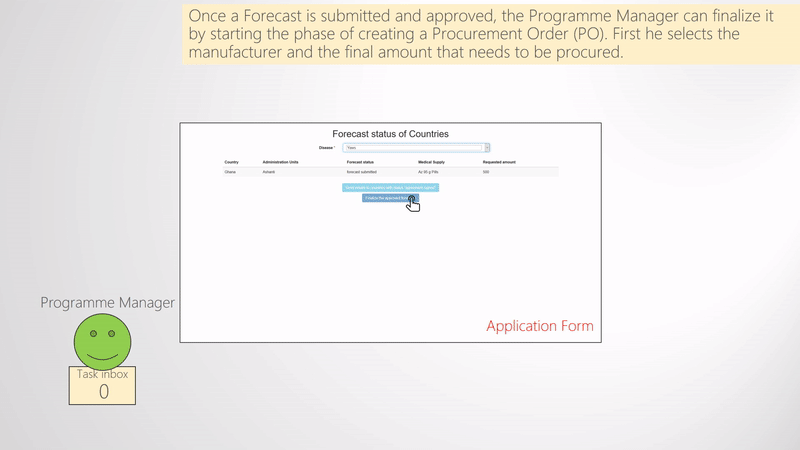
Create Shipment and Insert Delivery Dates
Finally, once the Procurement Order is created and the Manufacturer is notified, the task of the Manufacturer is to access an application and given the Procurement Order ID define the Splits for the shipment (in case the whole amount cannot be shipped/delivered at once) and insert the Estimated Delivery Dates. These dates can be updated and they can be accessed by all the actors who are involved in the Forecast. That is, for instance Ministries of Health can track the dates that are defined by the Manufacturer. The way a Manufacturer can create the shipments in WIMEDS is shown in Figure 5. Create Shipment and Insert Delivery Dates.
